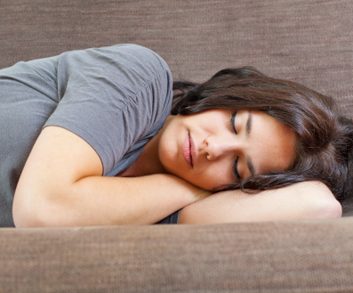
Do you have insomnia?
It’s 2 a.m. You haven’t slept yet. And you’re staring down an 8 a.m. meeting. Is it insomnia, a condition defined by the inability to fall or stay asleep throughout the night and suffering daytime consequences (such as sleepiness) as a result?
“Women are 150 percent more likely to have insomnia than men,” says Dr. Meir Kryger, a professor with the Yale School of Medicine in New Haven, Conn. and author of A Woman’s Guide to Sleep Disorders. Dr. Kryger also notes that there’s a difference between acute insomnia -generating from, say, too much coffee that day – to chronic insomnia, defined by sleeplessness at least three to four nights a week, for three months or more.
Why are women so susceptible? Part of it is the hormonal changes women experience in their lives, from monthly menstruation to post-partum hormonal changes to menopause, all of which can influence sleep. “There are also some diseases associated with insomnia that are much more common in women than men-for example, depression,” says Dr. Kryger.
But when it is 2 a.m. and you’ve had no sleep, how do you get through it? Here’s how some readers battle their insomnia.

Meditation
“After my mother passed away, I stopped sleeping. My grief took over everything, and the days and nights rolled into one. I visited a doctor who prescribed sleeping pills, which were effective until I became pregnant a year later with my son. I had to stop the pills immediately and I went through terrible withdrawal. My mother had always told me that prayer and meditation was the best medicine for insomnia and she was right. I started a regimen of prayer and meditation-15 minutes a night-and without fail I am lulled into a deep slumber. I’ve been doing this for 11 years now.”-Sarah Brown,* Toronto (*Not her real name)

A change of scenery
“I used to just stay in bed and toss and turn when I had insomnia. What’s working now is changing scenery. I head downstairs and try to sleep on the couch. If I have a lot on my mind, I also write a to-do list. Once I do that, I feel better and go to sleep.”-Michelle Mullins, Oakville, Ont.

Practise relaxation
“A therapist at university taught me some relaxation techniques such as a sleep exercise that involves deep breathing: Breathe in, count to one, breathe out, count to two, breathe in, count to three, continuing all the way up to 10 and then back down again. During that time you are relaxing your body and focusing solely on the breathing and counting. If your mind wanders, you start again. It took me three weeks of doing it every night for hours until it started working. Now, I rarely have problems falling asleep and if I do, the exercise helps me relax. It took me a couple of months to master it but it’s meant almost 20 years of falling asleep within five to 20 minutes.”-M-R Charbonneau, Ottawa

A sedating drug
“Gravol. Seriously. It doesn’t prevent me from waking up in the night but it allows me to fall back to sleep without reading or having my leg start to twitch.”-Chantal Saville, Peterborough, Ont. (While Dr. Kryger doesn’t recommend this technique on a regular basis, he acknowledges that in a pinch this would work. But you do run the risk of waking up groggier.)

Tire yourself out
“I switch to green tea mid-morning and avoid caffeine from mid-afternoon onwards. I also exercise no later than early evening, and try to unplug from screens by 9 p.m. and read a book instead. Sometimes I put on soft music to distract me. And I push through the next day to increase chance of fatigue.”-Coeur Riley Birmingham, Calgary
Taking melatonin
“I take melatonin by 10 p.m. most nights or half a sleeping pill if I’ve had two or three bad nights in a row.”-Coeur Riley Birmingham, Calgary
Melatonin is a hormone that plays a role in our sleeping and waking cycles. “It’s a bit controversial because in many places, it’s not available in pharmaceutical grade,” says Dr. Kryger. It’s best to consult your doctor or pharmacist before taking it.
Related:
• 5 steps to a perfect night’s sleep
• How sleep affects your health
• 8 reasons you can’t sleep at night

Taking melatonin
“I take melatonin by 10 p.m. most nights or half a sleeping pill if I’ve had two or three bad nights in a row.”-Coeur Riley Birmingham, Calgary
Melatonin is a hormone that plays a role in our sleeping and waking cycles. “It’s a bit controversial because in many places, it’s not available in pharmaceutical grade,” says Dr. Kryger. It’s best to consult your doctor or pharmacist before taking it.
Related:
• 5 steps to a perfect night’s sleep
• How sleep affects your health
• 8 reasons you can’t sleep at night
